-
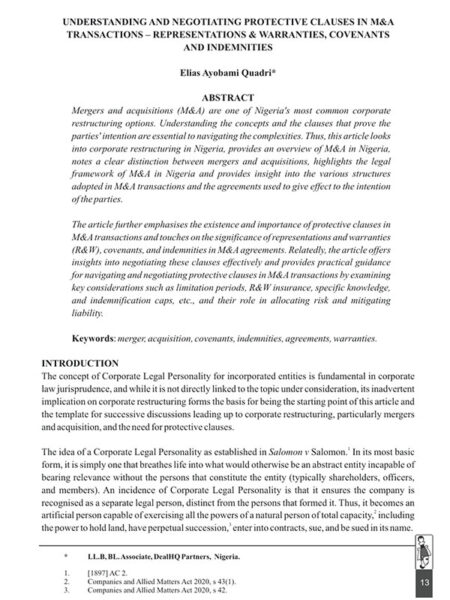
Understanding and Negotiating Protective Clauses in M&A Transactions – Representations & Warranties, Covenants & Indemnities
0₦2,500.00Elias Ayobami Quadri, in his article, Understanding and Negotiating Protective Clauses in M&A Transactions – Representations & Warranties, Covenants and Indemnities, discusses the legal effect of representation, warranties, covenants and indemnities in merger and acquisition transactions. In corporate restructurings, a clear understanding of the concepts and the clauses that evidence the intention of the parties are essential to navigating the complexities present therein. Elias looks into corporate restructuring in Nigeria, provides an overview of M&A in Nigeria, noting a clear distinction between mergers and acquisition, highlighting the legal framework of M&A in Nigeria, and providing insight into the various structures adopted in M&A transactions and the agreements used to give effect to the intention of the parties. Elias further emphasizes the existence and importance of protective clauses in M&A transactions and touches on the significance of representations and warranties (R&W), covenants, and indemnities in M&A agreements. Relatedly, Elias offers insights into negotiating these clauses effectively, and provides practical guidance for navigating and negotiating protective clauses in M&A transactions by examining key considerations such as limitation periods, R&W insurance, specific knowledge, and indemnification caps, etc., and its role in allocating risk and mitigating liability.
-
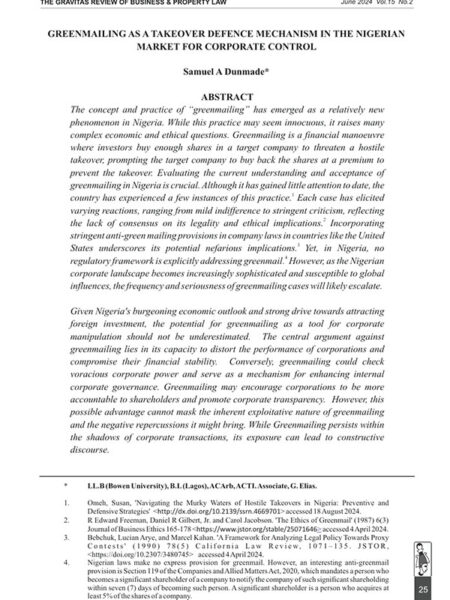
Greenmailing as a Takeover Defence Mechanism in the Nigerian Market for Corporate Control
0₦2,500.00Samuel A. Dunmade, in his article, Greenmailing as a Takeover Defence Mechanism in the Nigerian Market for Corporate Control, examines the concept and practice of “greenmailing” as a relatively new phenomenon in Nigeria. Put simply, greenmailing is a financial manoeuvre where investors buy enough shares in a target company to threaten a hostile takeover thereby prompting the target company to buy back the shares at a premium to prevent the takeover. Whilst this practice may seem innocuous on its surface, it raises a host of complex economic and ethical questions. It is crucial to evaluate the current understanding and acceptance of greenmailing in Nigeria. Although it has gained little attention to date, the country has experienced a few instances of this practice. Each case has elicited varying reactions, ranging from mild indifference to stringent criticism, a reflection of the lack of consensus on its legality and ethical implications. The incorporation of stringent anti-green mailing provisions in company laws in countries like the United States underscores its potential nefarious implications. Yet, in Nigeria, no regulatory framework is explicitly addressing greenmail. However, as the Nigerian corporate landscape becomes increasingly sophisticated and susceptible to global influences, the frequency and seriousness of greenmailing cases will likely escalate.
-
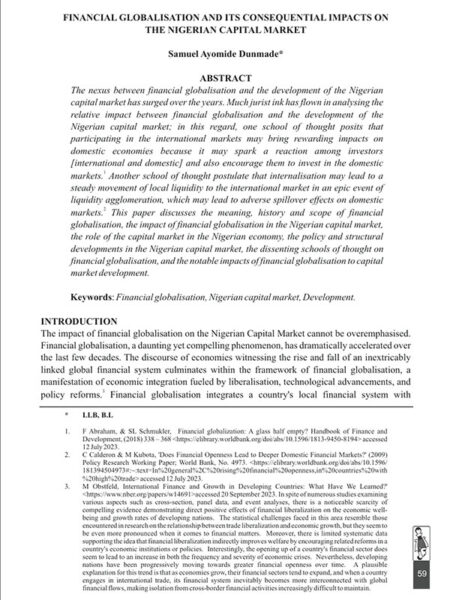
Financial Globalisation and its Consequential Impacts on the Nigerian Capital Market
0₦2,500.00Samuel Dunmade, in his article, Financial Globalisation and its Consequential Impacts on the Nigerian Capital Market, examines the concept of financial globalisation and its impact on the Nigerian capital market. The nexus between financial globalisation and the development of the Nigerian capital market has surged over the years. Much jurist ink has flown in analyzing the relative impact between financial globalisation and the development of the Nigerian capital market; in this regard, one school of thought posits that participating in the international markets may bring rewarding impacts on domestic economies, because it may spark a reaction among investors [international and domestic] and also encourage them to invest in the domestic markets. Another school of thought postulates that the internalization may lead to a steady movement of local liquidity to the international market in an epic event of liquidity agglomeration, which may lead to negative spill-over effects on domestic markets. Dunmade discusses the meaning, history and scope of financial globalization, the impact of financial globalisation in the Nigerian capital market, the role of capital market in the Nigerian economy, the policy and structural developments in the Nigerian capital market, the dissenting schools of thought on financial globalization, and the notable impacts of financial globalisation to capital market development.
-
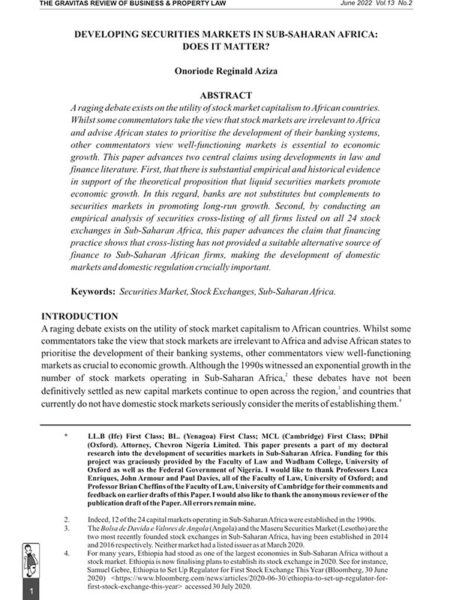
Developing Securities Markets in Sub-Saharan Africa: Does it Matter?
0₦2,500.00Dr Onoriode Aziza of Chevron Nigeria, in his landmark study, Developing Securities Markets in Sub-Saharan Africa: Does it Matter? notes the raging debate on the utility of stock market capitalism to African countries. Whilst some commentators take the view that stock markets are irrelevant to Africa and advise African states to prioritise the development of their banking systems, other commentators view well-functioning markets as essential to economic growth. Dr Aziza advances two central claims using developments in law and finance. First, there is substantial empirical and historical evidence supporting the theoretical proposition that liquid securities markets promote economic growth. In this regard, banks are not substitutes but complement securities markets in promoting long-run growth. Second, by conducting an empirical analysis of securities cross-listing of all firms listed on all 24 stock exchanges in Sub-Saharan Africa, Dr Aziza advances the claim that cross-listing has not provided a suitable alternative source of finance to Sub-Saharan African firms, making the development of domestic markets and regulation crucially important.
-
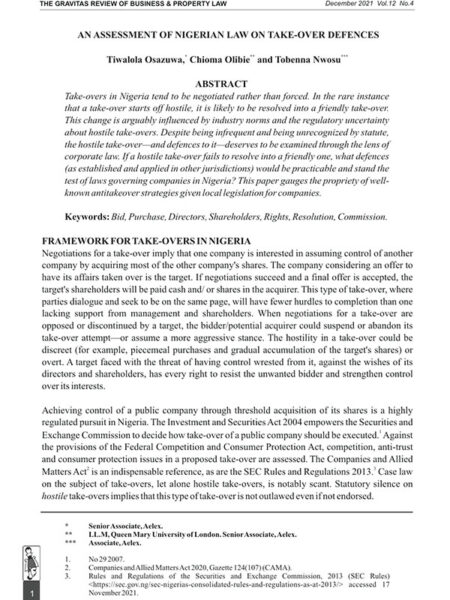
An Assessment of Nigerian Law on Take-Over Defences
0₦2,500.00Tiwalola Osazuwa, Chioma Olibie, and Tobenna Nwosu, all of Aelex in their article, An Assessment of Nigerian Law on Take-Over Defences, note that take-overs in Nigeria tend to be negotiated rather than forced. In the rare instance that a take-over starts off hostile, it is likely to be resolved into a friendly take-over. Though hostile take-over is unrecognised by statute in Nigeria, Osazuwa et al examine the framework for take-overs through the lens of corporate law. They consider take-over devices and defences and well-known anti-takeover strategies.
-
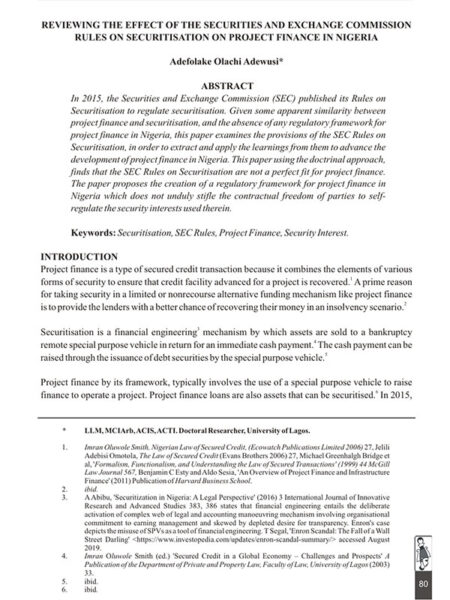
Reviewing the Effect of the Securities and Exchange Commission Rules on Securitisation on Project Finance in Nigeria
0₦2,500.00Adefolake Adewusi, Doctoral Researcher at the University of Lagos in her article, Reviewing the Effect of the Securities and Exchange Commission Rules on Securitisation on Project Finance in Nigeria, posits that the Securities and Exchange Commission (SEC) published its Rules on Securitisation in 2015 to regulate securitisation. Given the apparent similarity between project finance and securitisation, and in the absence of any regulatory framework for project finance in Nigeria. Adefolake examines the provisions of the SEC Rules on Securitisation to extract and apply the principles from them to advance the development of project finance in Nigeria. She argues that the SEC Rules on Securitisation are not a perfect fit for project finance and propose the creation of a regulatory framework for project finance in Nigeria which does not unduly stifle the contractual freedom of parties to self-regulate the security interests used.
-
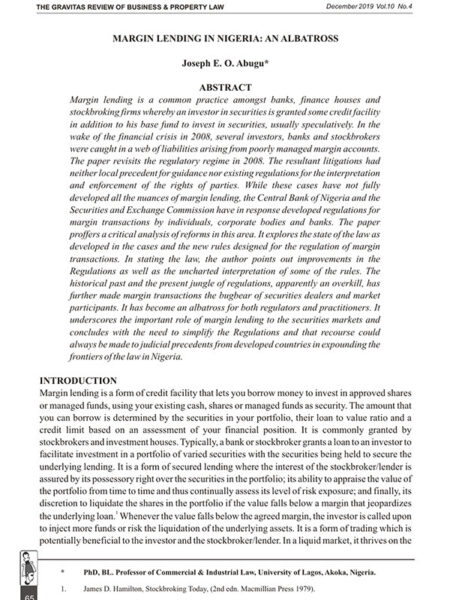
Margin Lending in Nigeria: An Albatross
0₦2,500.00Joseph Abugu, Professor of Commercial & Industrial Law, University of Lagos Akoka Nigeria in his article, Margin Lending in Nigeria: An Albatross, notes that Margin Lending is a common practice amongst banks, finance houses and stockbroking firms whereby an investor in securities is granted credit facility in addition to his base fund to invest in securities, usually speculatively. In the wake of the financial crisis of 2008, several investors, banks and stockbrokers were caught in a web of liabilities arising from poorly managed margin accounts. The resultant litigations had neither local precedent for guidance nor existing regulations for the interpretation and enforcement of rights. While the cases have not fully developed all the nuances of Margin Lending, the Central Bank of Nigeria and the Securities and Exchange Commission have in response developed regulations for margin transactions by individuals, corporate bodies and banks. Professor Abugu, in his usual inimitable style, explores the state of the law as developed in the cases and the new rules designed for the regulation of margin transactions.
-
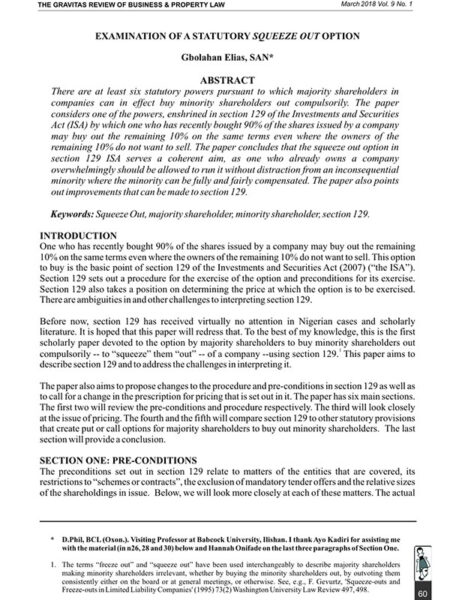
Examination of a Statutory Squeeze Out Option
0₦2,500.00Professor Gbolahan Elias, Chairman, Lagos State Law Reform Commission, and Partner G. Elias & Co in his article, “Examination of a Statutory Squeeze Out Option”, notes that there are at least six statutory powers pursuant to which majority shareholders in companies can in effect buy minority shareholders out compulsorily. He considers one of the powers enshrined in section 129 of the Investments and Securities Act (ISA) by which one who has recently bought 90% of the shares issued by a company may buy out the remaining 10% on the same terms even where the owners of the remaining 10% do not want to sell. He concludes that the squeeze out option in section 12 ISA is, as one who already owns a company overwhelmingly should be allowed to run it without distraction from an inconsequential minority where the minority can be fully and fairly compensated.
-
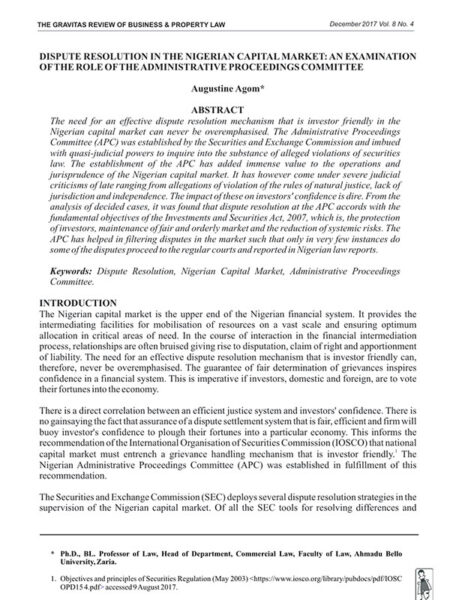
Dispute Resolution in the Nigerian Capital Market: An Examination of the Role of the Administration Proceedings Committee
0₦2,500.00Professor Augustine Agom, Head of Department, Commercial Law Ahmadu Bello University, Zaria in his article, “Dispute Resolution in the Nigerian Capital Market: An Examination of the Role of the Administrative Proceedings Committee”, considers the role of the Administrative Proceedings Committee in the resolution of disputes, its creation, constitution, and procedure. He tackles the criticisms against the Committee especially the allegations of determination of issues with elements of crime, and of violation of fair hearing by the Committee due to the all-pervading influence of the Securities and Exchange Commission.
-
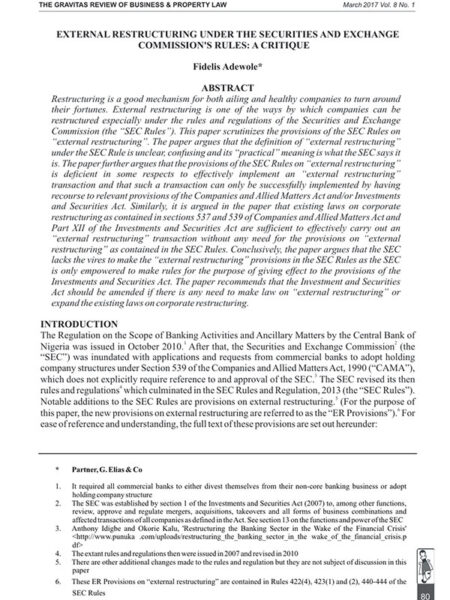
External Restructuring under the Securities and Exchange Commission’s Rules: A Critique
0₦2,500.00Fidelis Adewole, Partner, Elias & Co in “External Restructuring under the Securities and Exchange Commission’s Rules: A Critique” scrutinises the provisions of the SEC Rules on “external restructuring” (ER) and argues that the provisions are vague, confusing and inadequate for the effective implementation of ER transactions. He posits that the provisions of the Companies and Allied Matters Act and the Investments and Securities Act are adequate to cover ER transactions and therefore the ER Provisions by the SEC are unnecessary just as the SEC has no power to make the Rules in the first place.
-
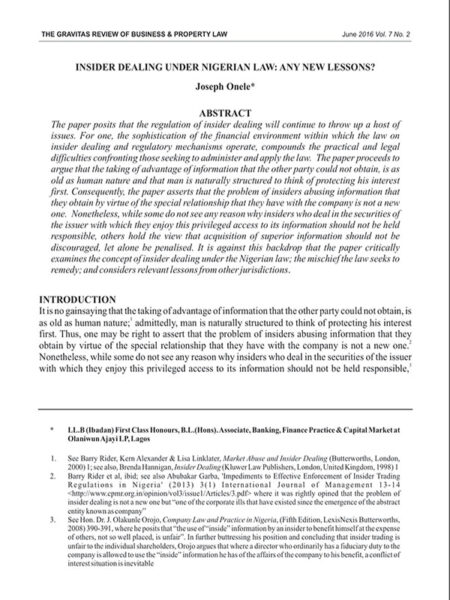
Insider Dealing under Nigerian Law: Any New Lessons?
0₦2,500.00Joseph Onele, Associate, Olaniwun Ajayi LP in “Insider Dealing Under Nigerian Law: Any New Lessons?” undertakes a comprehensive review of the legal framework for dealing with insider trading under Nigerian Law. He identifies notable gaps in the law and indicates lessons that can be learnt from other jurisdictions including the U.S and UK.
-
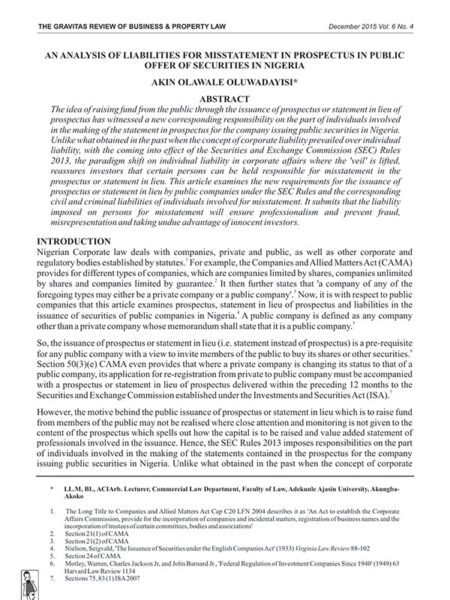
An Analysis of Liabilities for Misstatement in Prospectus in Public Offer for Securities in Nigeria
0₦2,500.00Akin Oluwadayisi, Lecturer, Commercial Law Department, Adekunle Ajasin University, Akungba-Akoko in “An Analysis of Liabilities for misstatement in Prospectus in Public Offer of Securities in Nigeria” discusses the liability of officers of a company and professionals for untrue statements in Prospectus in public offer of securities. He argues that individual liability now provided for by regulations is necessary to ensure professionalism and prevent fraud and abuse.
The Gravitas Review of Business & Property Law



